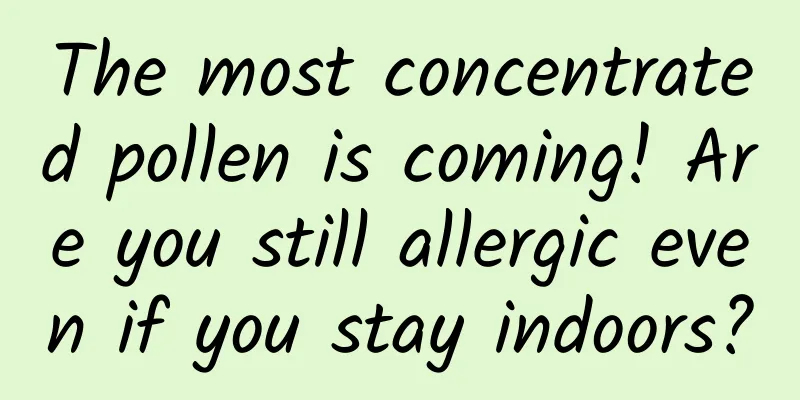The most concentrated pollen is coming! Are you still allergic even if you stay indoors?

|
The annual spring pollen season has quietly arrived again. This year, the pollen concentration has reached a suffocating "king bomb" level! Many friends have already felt its "power" in advance. Paroxysmal sneezing, itchy eyes, itchy skin, and clear nasal discharge... Are these familiar symptoms reminding you: allergic rhinitis, it's here again! So, how can we make comprehensive preparations to successfully get through this pollen season? Pollen concentration reaches its peak Allergic rhinitis is an allergic reaction caused by human body contact with allergens. It can be divided into seasonal and perennial types according to the duration of symptoms. Seasonal allergic rhinitis is often caused by pollen from flowers, grasses and trees, commonly known as hay fever. Now is spring, and the pollen concentration is gradually rising, which is the reason why the number of patients with allergic rhinitis has gradually increased recently. Data show that pollen concentrations in most areas will reach a peak in mid-to-late March, and the main allergens come from "wind-pollinated flowers" that spread pollen by wind, especially cypress, poplar, willow, etc. Therefore, patients with allergic rhinitis should pay special attention at this time and try to avoid contact with these allergens. Is it not just a sneeze, but also a prelude to asthma? Although allergic rhinitis may seem like a minor problem, it may lead to a series of serious consequences if not taken seriously. According to a study by the Allergy Branch of the Chinese Medical Association, up to 46% of allergic rhinitis patients will develop asthma within 9 years. Allergic rhinitis and asthma are both airway allergic diseases, and there is a close connection between the two. The nasal cavity and the bronchi belong to the same airway. When the nasal cavity is stimulated by allergens, it will cause swelling of the nasal mucosa and increased secretions, which will lead to nasal congestion. Patients have to breathe through their mouths, which makes allergens and bacteria directly stimulate the lower respiratory tract, increasing the risk of asthma. In addition, rhinitis may also cause a series of problems such as sinusitis, hypertrophy of nasal conchae, hypertrophy of adenoids, and even affect our appearance. Therefore, patients with allergic rhinitis must seek treatment early to avoid worsening of the disease. Pollen Wars Preparation: Activate Your Spring Survival Mode 1. Try to avoid allergens Environmental control is the key to preventing and treating allergic rhinitis. If you already know your allergens, then avoiding them as much as possible is the best way. For patients who are allergic to pollen, during the pollen season: • Try to reduce going out, close doors and windows, and use an air purifier. • When going out, be sure to wear a protective mask and glasses to reduce the chance of pollen entering your nose and eyes. • After returning home, wash your clothes and hair promptly, and rinse your nasal cavity, face and mouth with salt water to remove any remaining pollen. • Regularly vacuuming or using a damp cloth can reduce the accumulation of dust and pollen. 2. Use anti-allergy drugs in advance For patients with allergic rhinitis who have been diagnosed, it is recommended to use anti-allergic drugs for prevention one to two weeks before the pollen season. In this way, when the pollen season really comes, your symptoms will be relatively mild. But please note that you must use the drugs under the guidance of a doctor and do not use nasal sprays or antibiotics at will. 3. Keep exercising to improve immunity Long-term adherence to proper exercise can enhance our physical fitness and help us better cope with allergic rhinitis. Brisk walking, jogging, swimming, yoga, etc. are all good choices. It should be noted that when exercising, avoid doing it during the time and place with high pollen concentration. 4. Eat some "anti-allergy" foods Increasing the intake of lean meat, animal liver, soy products and other foods rich in protein and iron, as well as fresh vegetables and fruits, can effectively improve the body's defense capabilities. Foods such as honey and carrots also have anti-allergic effects and can be eaten appropriately. Finally, although allergic rhinitis cannot be completely cured at present, as long as we do a good job of standardized comprehensive prevention and treatment, we can effectively control the symptoms and reduce its impact on our lives. So, if you or your family are suffering from allergic rhinitis, don’t be afraid, let us work together to successfully get through this "pollen season"! |
<<: Interesting Medicine Talk | Loratadine (with audio)
Recommend
Children's eyelashes grow backwards, parents must not do this!
Two months ago, five-year-old Yueyue kept rubbing...
What to do if your lower abdomen is distended and your leucorrhea is abnormal
With the increase in living costs and work pressu...
How to nourish kidney for women
What methods should women choose to nourish their...
Menstruation not coming
Whether menstruation can come within the prescrib...
Can I do plank during menstruation?
Plank is an exercise that many women like to do. ...
What should I do if my face gets caught in the cold during confinement?
As we all know, when women are in confinement, th...
Misconceptions about eating eggs
There are many taboos when eating eggs, but they ...
Can I do it in the afternoon?
There are many things in the world that are the m...
What precautions should be taken after a pacemaker is installed?
A pacemaker is an electronic therapeutic device i...
World Hypertension Day, cartoons about blood pressure
Bai Hua-Date of visit: https://www.pumch.cn/detai...
Still bleeding 25 days after hysteroscopy
Hysteroscopy can immediately observe the changes ...
What to do if your belly is bloated during pregnancy
During pregnancy, various changes will occur in t...
What is the inflammation of the vaginal opening?
For female friends, there will always be some gyn...
How to relieve cold hands and feet, small countermeasures to get rid of cold hands and feet in women
In life, many people have the problem of cold han...









